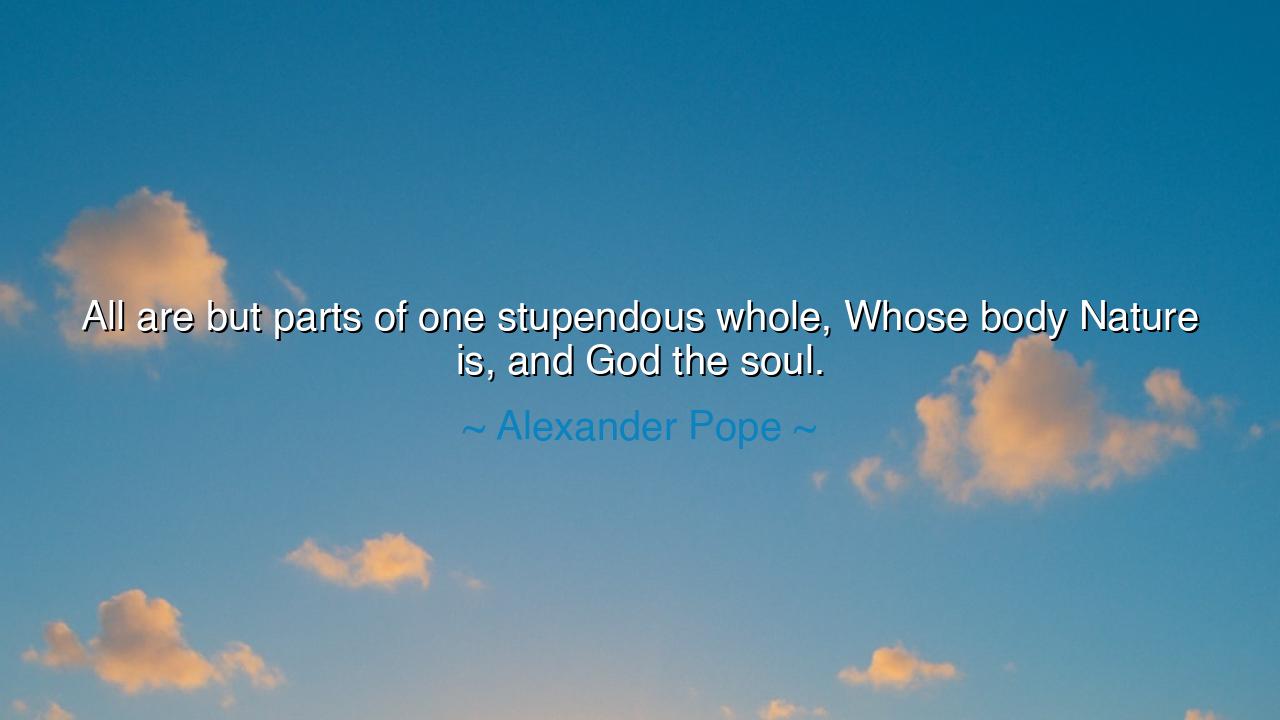
All are but parts of one stupendous whole, Whose body Nature is






Hear the eternal words of Alexander Pope: “All are but parts of one stupendous whole, Whose body Nature is, and God the soul.” These lines, drawn from his Essay on Man, speak with the voice of ancient wisdom clothed in the language of poetry. Pope, standing in the age of reason, reached beyond mere philosophy into the mystery of existence itself: that every creature, every stone, every star, every breath belongs to a single vast harmony. The universe is not scattered fragments, but one living body — Nature as its flesh, God as its animating spirit.
This vision is not new; it echoes across the halls of history. The Stoics taught that the cosmos is a living organism, infused with the logos, the divine reason that binds all things together. In the East, the Upanishads proclaimed that Atman — the soul within — is one with Brahman, the soul of the universe. The Hebrew prophets sang of the heavens declaring God’s glory, and Saint Paul wrote that in God “we live, and move, and have our being.” Pope’s words gather these rivers of wisdom into one ocean: that man is not an isolated island, but a wave upon the eternal sea.
To say we are parts of a stupendous whole is to affirm our unity with all things. The bird in flight, the river flowing, the mountain rising, the human heart beating — all are threads in the same divine tapestry. The hand cannot despise the foot, nor can the leaf mock the root, for each has its place, its purpose, its dignity within the whole. In a world torn by division, Pope’s vision calls us back to reverence: for when we harm another, we harm ourselves, and when we cherish creation, we cherish the very life of God within it.
Consider the life of Saint Francis of Assisi, who lived this truth with holy simplicity. To him, the sun was brother, the moon sister, the wolf a companion, the leper a mirror of Christ. He did not see creation as mere backdrop to human drama, but as kin bound in one whole, radiant with the presence of God. In speaking with birds, in praising rivers, in kissing the wounds of the suffering, Francis enacted Pope’s vision centuries before it was penned. He knew that Nature was not dead matter, but the living body of the divine.
Pope also reminds us of humility. To be a part of the whole is to accept that our lives are not the center, but one note in the great symphony. Man, in his pride, often imagines himself master of the world, yet even kings fall, and empires crumble, while the earth endures. But far from diminishing us, this realization elevates us: for though we are small, we belong to something infinitely greater. We are not lost fragments drifting in chaos; we are members of a cosmic body, whose soul is eternal.
The lesson here is clear: live in harmony with Nature, and you live in harmony with God. Do not sever yourself from the earth, for it is your body; do not sever yourself from others, for they share your soul. See the divine in the smallest flower, in the cry of the poor, in the majesty of the stars. Let reverence guide your actions, for to pollute the rivers, to wound the forests, to scorn humanity, is to strike at the very body of which you are a part.
Practically, begin by cultivating awareness: walk outside and see not “resources” but relatives; not “things” but living members of the same whole. Practice kindness toward others, remembering they share in the same divine soul. Let gratitude for air, water, food, and earth awaken responsibility. And above all, remember that your life has meaning not in isolation, but in connection. You are a part of the stupendous whole, called to live not for self alone, but for the harmony of all.
So let Pope’s words thunder in your spirit: “All are but parts of one stupendous whole, Whose body Nature is, and God the soul.” Hold fast to this vision, and you will never be lost, for you will know yourself as both small and infinite — a single leaf upon the eternal tree, nourished by the root of God, and shining in the light of eternity.






AAdministratorAdministrator
Welcome, honored guests. Please leave a comment, we will respond soon